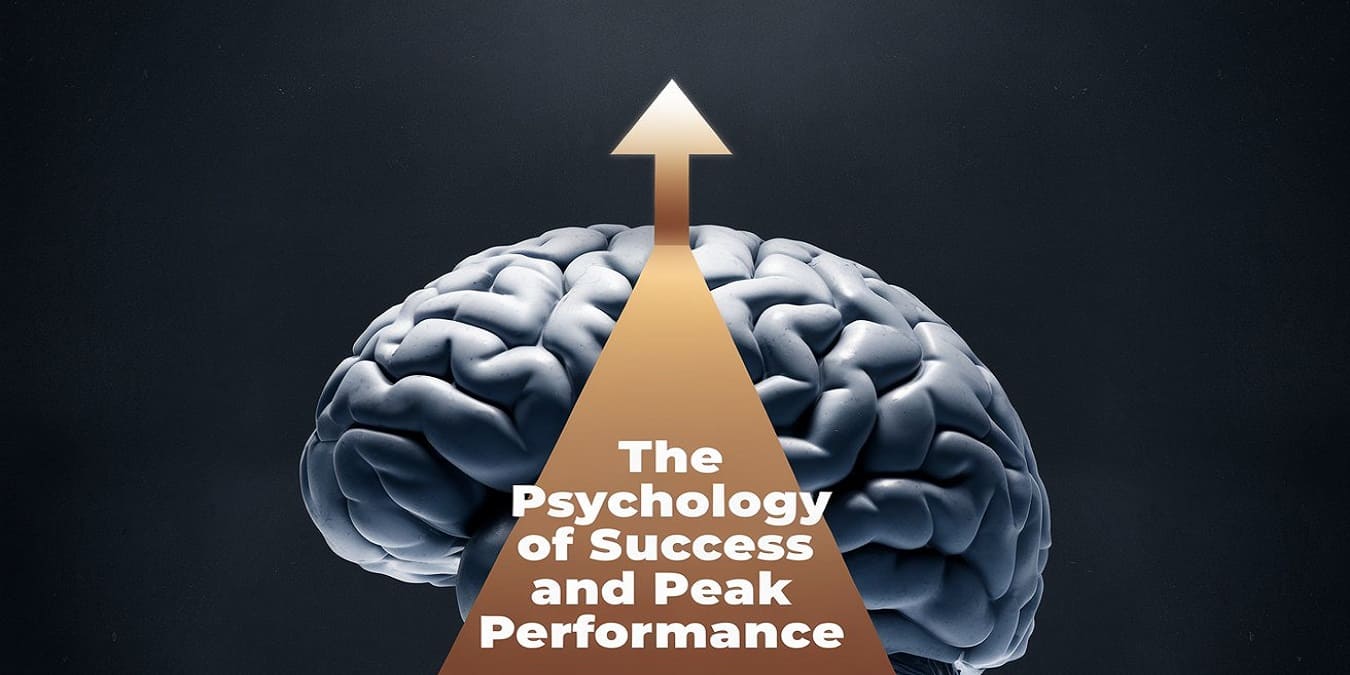
The Psychology of Success and Peak Performance
Have you ever wondered why some people seem to effortlessly achieve success while others struggle to make progress? What separates top performers from the rest?
The answer lies in the psychology of success and the science of peak performance. These concepts aren’t just buzzwords, they’re powerful frameworks that can help you unlock your full potential and achieve extraordinary results.
Whether you’re an entrepreneur, an athlete, a student or someone simply looking to improve your life, understanding the mental and emotional drivers behind success can transform the way you approach challenges, set goals and perform under pressure.
In this blog post, we’ll dive deep into the psychology of success, explore the principles of peak performance and provide actionable strategies to help you thrive in every area of your life.
Ready to take control of your mindset and achieve your goals? Let’s get started.
What Is the Psychology of Success?
The psychology of success is the study of the mental and emotional factors that contribute to achieving goals and excelling in life. It’s about understanding how your thoughts, beliefs and behaviors influence your outcomes. Success isn’t just about talent or luck, it’s about mindset, habits and resilience.
Key Components of the Psychology of Success
- Growth Mindset: Believing that your abilities can be developed through effort and learning.
- Self-Discipline: The ability to stay focused and consistent, even when motivation wanes.
- Resilience: Bouncing back from setbacks and using failure as a stepping stone.
- Emotional Intelligence: Understanding and managing your emotions to build better relationships and make smarter decisions.
The Science of Peak Performance
Peak performance is the state of operating at your highest level of ability. It’s when you’re fully immersed in a task, performing effortlessly and achieving exceptional results. Think of it as being “in the zone.”
What Drives Peak Performance?
- Flow State: A mental state where you’re completely focused and energized by the task at hand.
- Optimal Arousal: The right balance of stress and relaxation to perform at your best.
- Purpose and Motivation: Having a clear “why” that fuels your actions.
- Preparation and Practice: Consistent effort to build skills and confidence.
10 Strategies to Master the Psychology of Success and Achieve Peak Performance
Now that we’ve covered the basics, let’s explore 10 actionable strategies to help you harness the psychology of success and reach peak performance.
-
Cultivate a Growth Mindset
Your mindset is the foundation of success. A growth mindset, a term coined by psychologist Carol Dweck, is the belief that your abilities can improve with effort and learning.
How to Implement
- Embrace challenges as opportunities to grow.
- View failure as feedback, not a final verdict.
- Celebrate effort and progress, not just outcomes.
Why It Works
A growth mindset fosters resilience, creativity and a love for learning the key ingredients for long-term success.
-
Set SMART Goals
Goals give you direction and purpose. But not all goals are created equal. SMART goals (Specific, Measurable, Achievable, Relevant and Time-bound) are designed to keep you focused and motivated.
How to Implement
- Break big goals into smaller, actionable steps.
- Track your progress regularly.
- Adjust your goals as needed to stay aligned with your vision.
Why It Works
SMART goals provide clarity and structure, making it easier to stay on track and measure success.
-
Develop Emotional Intelligence
Emotional intelligence (EQ) is the ability to recognize, understand and manage your emotions and those of others. It’s a critical skill for building relationships, making decisions and staying resilient.
How to Implement
- Practice self-awareness by reflecting on your emotions.
- Improve empathy by actively listening to others.
- Manage stress through mindfulness and relaxation techniques.
Why It Works
High EQ leads to better communication, stronger relationships and improved decision-making.
-
Build Resilience
Resilience is the ability to bounce back from setbacks and keep moving forward. It’s what separates those who give up from those who persevere.
How to Implement
- Reframe challenges as opportunities for growth.
- Develop a strong support system of friends, family or mentors.
- Practice self-care to maintain physical and mental well-being.
Why It Works
Resilience helps you stay focused and motivated, even in the face of adversity.
-
Master the Art of Focus
In a world full of distractions, focus is a superpower. The ability to concentrate on what truly matters is essential for achieving peak performance.
How to Implement
- Use techniques like the Pomodoro Method to stay focused.
- Eliminate distractions by creating a dedicated workspace.
- Prioritize tasks based on importance and urgency.
Why It Works
Focus allows you to work more efficiently and produce higher-quality results.
-
Embrace the Power of Habits
Your habits shape your life. By building positive habits, you can create a foundation for long-term success.
How to Implement
- Start small and gradually build momentum.
- Use triggers and rewards to reinforce new habits.
- Track your progress to stay accountable.
Why It Works
Habits automate positive behaviors, making it easier to stay consistent and achieve your goals.
-
Practice Mindfulness
Mindfulness is the practice of being fully present in the moment. It’s a powerful tool for reducing stress, improving focus and enhancing performance.
How to Implement
- Start with short meditation sessions.
- Practice deep breathing exercises.
- Incorporate mindfulness into everyday activities, like eating or walking.
Why It Works
Mindfulness helps you stay calm, focused and in control, even in high-pressure situations.
-
Find Your Purpose
Purpose is the driving force behind sustained motivation and fulfillment. When you know your “Why,” you’re more likely to stay committed to your goals.
How to Implement
- Reflect on your values and passions.
- Align your goals with a larger mission.
- Regularly revisit your purpose to stay inspired.
Why It Works
Purpose provides direction and meaning, making it easier to overcome obstacles and stay motivated.
-
Optimize Your Environment
Your environment plays a significant role in your success. By creating a supportive and inspiring space, you can enhance your productivity and well-being.
How to Implement
- Declutter your workspace to reduce distractions.
- Surround yourself with positive influences.
- Incorporate elements that inspire creativity and focus.
Why It Works
A well-designed environment fosters focus, creativity and motivation.
-
Continuously Learn and Adapt
Success is a journey, not a destination. To stay ahead, you must be willing to learn, adapt and evolve.
How to Implement
- Seek feedback and use it to improve.
- Stay curious and explore new ideas.
- Invest in personal and professional development.
Why It Works
Continuous learning keeps you relevant, adaptable and open to new opportunities.
Final Thoughts
The psychology of success and the principles of peak performance are powerful tools for achieving your goals and living a fulfilling life. By cultivating a growth mindset, building resilience and optimizing your habits and environment, you can unlock your full potential and perform at your best.
Remember, success isn’t about perfection, it’s about progress. Start small, stay consistent and keep pushing forward. As you apply these strategies, you’ll not only achieve your goals but also develop the mental and emotional strength to thrive in any situation.
So, what’s your first step toward mastering the psychology of success? Share your thoughts in the comments below!
FAQs
Q: What is the psychology of success?
A: The psychology of success is the study of the mental and emotional factors that contribute to achieving goals and excelling in life.
Q: How can I achieve peak performance?
A: Achieving peak performance requires focus, preparation and a clear sense of purpose. Techniques like mindfulness, goal-setting and habit-building can help.
Q: Can anyone develop a growth mindset?
A: Yes! A growth mindset can be developed through self-awareness, effort and a willingness to learn from challenges.
Q: How do habits influence success?
A: Habits automate positive behaviors, making it easier to stay consistent and achieve long-term goals.
Q: What role does emotional intelligence play in success?
A: Emotional intelligence helps you manage emotions, build relationships and make better decisions, all critical for success.
Q: How can I stay motivated when facing setbacks?
A: Focus on your purpose, practice resilience and seek support from others to stay motivated during tough times.
Q: Is peak performance only for athletes?
A: No! Peak performance applies to anyone looking to excel in their field, whether it’s business, academics or personal development.
By understanding and applying the psychology of success and peak performance, you can transform your life and achieve extraordinary results. Start today, your future self will thank you!















I like this weblog so much, saved to fav.
Brilliant deductive reasoning!
Thanks for the sensible post. Me and my neighbor were just preparing to do some research on this. We got a grab a book from our local library but I think I learned more clear from this post. I am very glad to see such fantastic info being shared freely out there.